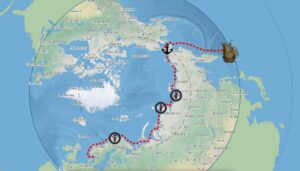Europe’s earliest human remains date from around 1.4 million years ago. But new evidence of a sudden temperature drop suggests humans did not survive there continuously.
Researchers from the IBS Centre for Climate Physics in Busan, South Korea studied ocean sediment from off the Portuguese coast. They found that 1.1 million years ago, the average winter temperature across Europe plummeted by as much as 5°C. With temperatures falling below freezing, early humans would have struggled to survive.
“Early humans were not yet well adapted to cope with such extreme conditions,” study director Axel Timmermann explained. “There is no direct evidence that they could even control fire at this time.”

During Europe’s cold period, the Mediterranean may have looked similar to the Asian steppe. Photo: Panikhin Sergey/Shutterstock
There followed a 200,000-year gap, with no signs of humans in Europe between 1.1 million years ago and 900,000 years ago. Scientists believe that Homo erectus, who had arrived in Europe from Africa, likely fled Europe because of the cold.
An evolutionary trigger?
The extreme cold snap “may have triggered evolutionary changes in humans, such as increased body fat as insulation, or increased hair,” Nick Ashton of the British Museum told BBC News. “It may also have led to technological developments such as improved hunting or scavenging skills, and abilities to create more effective clothing and shelters.”
Stone tools and footprints preserved in clay from Happisburgh in Norfolk, England show that early humans had returned to Europe by 900,000 years ago. Researchers believe that these may have been a more advanced species called Homo antecessor.
“When humans came back to Europe…they were tolerating colder winters than today,” said Chris Stringer, a Natural History Museum scientist and co-author of the paper.






